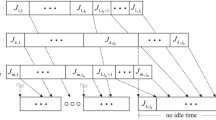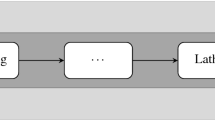Abstract
In this paper, we consider the problem of evaluating the worst case performance of flexible solutions in non-preemptive disjunctive scheduling. A flexible solution represents a set of semi-active schedules and is characterized by a partial order on each machine. A flexible solution can be used on-line to absorb the impact of some data disturbances related for example to job arrival, tool availability and machine breakdowns. Providing a flexible solution is useful in practice only if it can be assorted with an evaluation of the complete schedules that can be obtained by extension. For this purpose, we suggest to use only the best case and the worst case performance. The best case performance is an ideal performance that can be achieved only if the on-line conditions allow to implement the best schedule among the set of schedules characterized by the flexible solution. In contrast, the worst case performance indicates how poorly the flexible solution may perform. These performances can be obtained by solving corresponding minimization and maximization problems. We focus here on maximization problems when a regular minmax objective function is considered. In this case, the worse objective function value can be determined by computing the worse completion time of each operation separately. We show that this problem can be solved by finding an elementary longest path in the disjunctive graph representing the problem with additional constraints. In the special case of the flow-shop problem with release dates and additional precedence constraints, we give a polynomial algorithm that determines the worst case performance of a flexible solution.
Preview
Unable to display preview. Download preview PDF.
Similar content being viewed by others
References
Aloulou, M., Kovalyov, M., Portmann, M.C.: Maximization in single machine scheduling. Annals of Operations Research 129, 21–32 (2004)
Aloulou, M.A., Portmann, M.-C.: An efficient proactive-reactive scheduling approach to hedge against shop floor disturbance (Selected Papers). In: Kendall, G., Burke, E.K., Petrovic, S., Gendreau, M. (eds.) Multidisciplinary Scheduling: Theory and Applications. 1st International Conference, MISTA ’03, Nottingham, UK, 13-15 August 2003, pp. 13–15. Elsevier, Amsterdam (2005)
Artigues, C., Billaut, J.C., Esswein, C.: Maximization of solution flexibility for robust shop scheduling. European Journal of Operational Research 165(2), 314–328 (2005)
Baker, K.R.: Introduction to sequencing and scheduling. Wiley, Chichester (1974)
Billaut, J.C., Roubellat, F.: A new method for workshop real time scheduling. International Journal of Production Research 34(6), 1555–1579 (1996)
Erschler, J., Roubellat, F.: An approach for real time scheduling for activities with time and resource constraints. In: Slowinski, R., Weglarz, J. (eds.) Advances in project scheduling, Elsevier, Amsterdam (1989)
Esswein, C., Billaut, J.C., Strusevich, V.: Two-machine shop scheduling: Compromise between flexibility and makespan value. European Journal of Operational Research 167(3), 796–809 (2005)
Garey, M.R., Johnson, D.S.: Computers and Intractability: A Guide to the Theory of NP-Completeness. W.H. Freeman, New York (1979)
Lenstra, J.K., Rinnooy Kan, A.H.G., Brucker, P.: Complexity of machine scheduling problems. Annals of Discrete Mathematics 1 (1977)
Posner, M.E.: Reducibility among wighted completion time scheduling problems. Annals of Operations Research, 91–101 (1990)
Roy, B., Sussmann, B.: Les problèmes d’ordonnancement avec contraintes disjonctives, D.S. vol. 9, SEMA, Paris, France (1964)
Wu, S.D., Byeon, E.S., Storer, R.H.: A graph-theoretic decomposition of the job-shop scheduling problem to achieve scheduling robustness. Operations Research 47(1), 113–124 (1999)
Author information
Authors and Affiliations
Editor information
Rights and permissions
Copyright information
© 2007 Springer-Verlag Berlin Heidelberg
About this paper
Cite this paper
Aloulou, M.A., Artigues, C. (2007). Worst-Case Evaluation of Flexible Solutions in Disjunctive Scheduling Problems. In: Gervasi, O., Gavrilova, M.L. (eds) Computational Science and Its Applications – ICCSA 2007. ICCSA 2007. Lecture Notes in Computer Science, vol 4707. Springer, Berlin, Heidelberg. https://doi.org/10.1007/978-3-540-74484-9_89
Download citation
DOI: https://doi.org/10.1007/978-3-540-74484-9_89
Publisher Name: Springer, Berlin, Heidelberg
Print ISBN: 978-3-540-74482-5
Online ISBN: 978-3-540-74484-9
eBook Packages: Computer ScienceComputer Science (R0)




